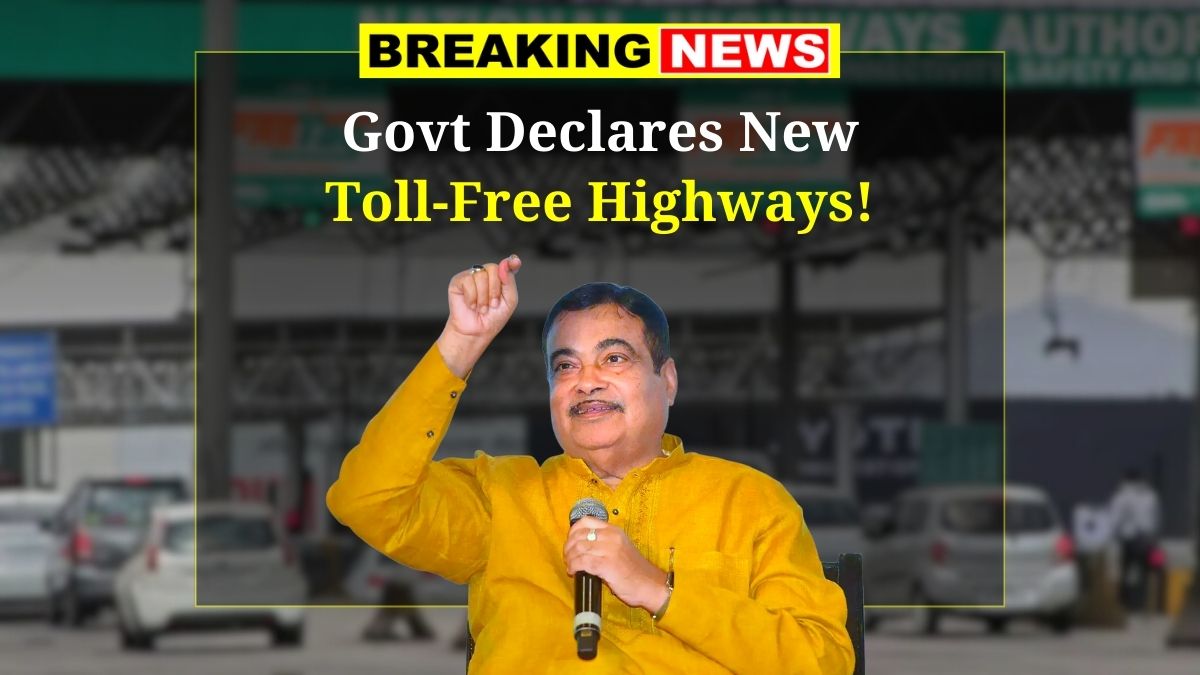Toll-Free Highways – In a major step towards easing travel and boosting road connectivity, the Government of India has made several national and state highways toll-free. This move is expected to benefit millions of commuters, reducing travel costs, improving access, and eliminating congestion at toll booths.
The Ministry of Road Transport and Highways has unveiled a list of more than 120 road stretches across the country that are now free from toll charges. This is good news for daily commuters, logistics companies, and those making religious or pilgrimage trips, as the government is working to ease their travel burdens.
Key Toll-Free Routes
Several high-profile roads have been exempted from toll fees. These include routes critical for defense, religious journeys, and tourism, among others. For instance, the stretch from Jammu to Udhampur on NH-44 has been made toll-free. This will allow easier access to remote regions and defense-critical areas in the North. Pilgrimage routes like Nashik to Trimbakeshwar in Maharashtra, and Faizabad to Prayagraj in Uttar Pradesh, which often experience high traffic during religious festivals, have also been made toll-free.
In the Northeast, the highway from Guwahati to Tezpur has joined the toll-free list. This will not only ease travel for residents but also facilitate quick responses during monsoon flood relief operations. Meanwhile, the Mysore-Wayanad eco-sensitive corridor in the South has been exempted from tolls, a move that supports both environmental conservation and tourism.
Other major toll-free roads include the Amritsar to Wagah Border road in Punjab, which promotes tourism, and sections of NH-310 in Sikkim, which are strategically vital for defense logistics near the India-China border.
Why These Roads Were Chosen
The selection of these roads was not random. The government targeted routes that are crucial for regional development, defense operations, religious tourism, and economic growth. Many of these roads are heavily traveled, with high commuter volumes or significant seasonal traffic, especially during festivals or pilgrimages. Toll collection had been slowing down traffic, increasing fuel consumption, and causing frustration among travelers. By removing tolls, the government aims to eliminate these bottlenecks, cut down travel time, and ease the overall burden on people.
Additionally, some of the routes serve rural or lower-income areas where toll charges would have been an added financial burden. The decision to make these roads toll-free is aligned with the government’s goal of improving accessibility for all citizens, particularly those in underdeveloped regions.
Benefits for Daily Commuters and Local Economies
For regular travelers, especially those who drive frequently for work, this change will result in significant savings. Commuters who previously paid hefty toll charges every month can now expect to save thousands of rupees, which is a relief for those with tight budgets. This will encourage more travel for both business and leisure, potentially boosting local economies.
Small businesses that rely on road transport for delivering goods will also benefit from reduced logistics costs. This will make their services more affordable and competitive. As a result, local businesses, especially in smaller cities and towns, are likely to see a positive economic impact, as the lower transportation costs will encourage more trade and commerce.
In urban areas like Delhi-NCR, toll-free access on parts of the Eastern Peripheral Expressway and other state highways is expected to reduce congestion and cut down on travel delays. In cities like Mumbai, Thane, and Navi Mumbai, where multiple roads have been exempted from tolls, commuting will be smoother, which means people can spend less time stuck in traffic.
Similarly, in the southern states, roads in Karnataka, Kerala, and Tamil Nadu that connect cities and towns will likely see increased weekend and seasonal travel. This will have a positive impact on the local hospitality and transport sectors, as more people will be able to visit nearby destinations for short trips or vacations.
The Future of Toll Collection
Even though these roads are now toll-free, toll collection is far from being a thing of the past. The government plans to implement a more advanced, digital tolling system in the future. This new system will use GPS-based technology to calculate toll charges based on the distance a vehicle travels rather than relying on traditional toll booths. The goal is to make the tolling process more efficient by eliminating the need for physical infrastructure and long queues at toll plazas.
This shift to a digital system will help streamline traffic flow and make the entire tolling process faster and more transparent. With real-time tracking and precise billing, travelers will have more flexibility and better control over their toll payments, making the entire experience more convenient.
A Step Towards Better Connectivity
The government’s decision to remove toll charges on key roads is a positive move that will benefit millions of people across India. It improves accessibility, reduces travel costs, and helps streamline the movement of goods and people. These changes are expected to have a ripple effect on the economy, encouraging business growth, tourism, and regional development.
For those planning to travel, it’s a good idea to stay updated on the status of toll-free roads. The National Highways Authority of India (NHAI) and regional transport websites will provide the latest information about road conditions and toll exemptions. With these changes, India is moving towards a more seamless and accessible travel experience for all.





